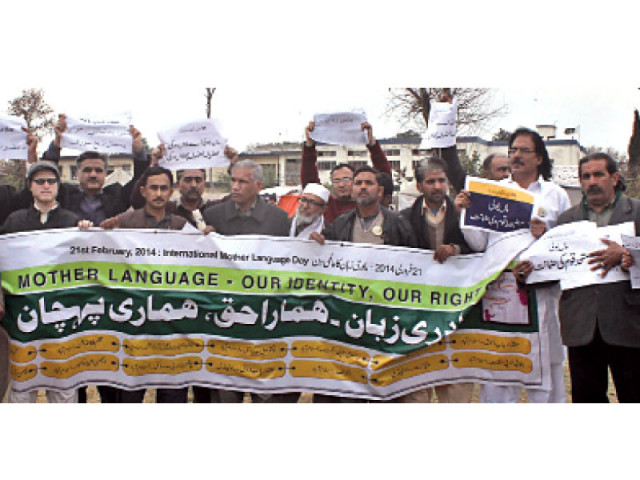Mother tongue day: Save indigenous languages, promote diversity
Writers for preserving cultural heritage.

Writers holding a walk in Islamabad for promoting the mother tongue. PHOTO: EXPRESS
Experts believe some two dozen languages in Pakistan are fighting for their very survival and another several dozen of folk arts, crafts and traditions are facing the threat of extinction.
The country’s linguistic and cultural heritage can potentially help with socio-economic development of local communities, according to conservationists and archaeologists.
Concerns and suggestions about Pakistani heritage were shared at a heritage forum organised by the Taxila Institute of Asian Civilisations (TIAC) at Quaid-i-Azam University and the Silkroad Centre, an NGO on the occasion of the International Mother Language Day on Friday.
TIAC Director Dr Ashraf Khan said heritage buildings around Pakistan are under “tremendous pressure” due to overpopulation, encroachments, lack of funds for preservation and lack of capacity. Khan said promoting Pakistan’s cultural and linguistic heritage will also promote tolerance and peace in society.
Silkroad Centre Executive Director Ijlal Hussain said several groups and organisations were trying to protect historic buildings and monuments around Pakistan.
“But much remains to be done,” he said. “Most historic sites still remain uncataloged.”
He said around two dozen languages are facing extinction because of lack of patronage and promotion. He said many folk arts and crafts are equally endangered at present.
“We still view preserving cultural heritage as a burden on the national exchequer rather than a powerful catalyst for socio-economic development,” Hussain said.
National College of Arts (NCA) Rawalpindi campus Director Dr Nadeem Omar Tarar said NCA’s Historic Urban Landscape (HUL) pilot project is trying to include the management of historic sites in the city’s urban planning and development processes.
This will allow a framework that protects historic buildings from being affected during new development.
Tarar said the “adaptive reuse” of historic buildings by converting them to museums or to tourist information centres has proven to be better than typical preservation worldwide. Wajahat Ali, an architect working for the Aga Khan Cultural Service-Pakistan (AKCS-P) shared details of work done by the AKCS-P for reuse of the Shigar Fort and Khaplu Palace. He said both buildings were in a state of extreme ruin before AKCS-P intervened.
Ali said it is important to connect the adaptive reuse of historic building with the livelihood of local communities.
He said there were craftsmen in Shigar and Khaplu whose trades had almost become history. But by providing skill training to the younger generation and by helping the artisans market their products, the AKCSP helped revive the crafts, Ali said.
Walk for mother language
Writers from the twin cities held a walk from China Chowk to the National Press Club to mark the International Mother Language Day.
They emphasised that children can get better knowledge and education in their mother language.
Published in The Express Tribune, February 22nd, 2014.



















COMMENTS
Comments are moderated and generally will be posted if they are on-topic and not abusive.
For more information, please see our Comments FAQ